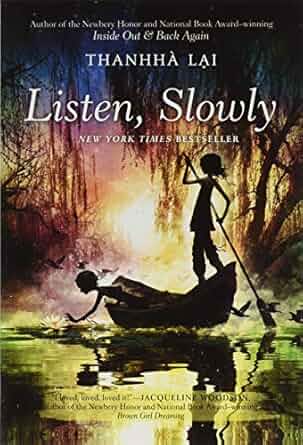A summer in Vietnam turns into a journey of self-discovery as Mai connects with the family and heritage she never knew.
“Listen, Slowly,” by Thanhhà Lại, welcomes young readers into the world of Mai, a twelve-year-old Vietnamese American from California whose summer plans are abruptly changed. Instead of the beach, Mai finds herself accompanying her grandmother to Vietnam, a country she knows only through stories. The trip’s purpose is to uncover the fate of her grandfather, who disappeared during the Vietnam War. Thrown into a rural village without modern conveniences, Mai grapples with a language she barely speaks and a culture that feels both foreign and faintly familiar. She navigates her relationship with her grieving grandmother and forges new connections with her extended family and local children, slowly piecing together the puzzle of her family’s past.
The novel offers a rich educational journey into contemporary Vietnam, viewed through the relatable lens of a second-generation immigrant. Lại explores the complexities of family, memory, and the lasting impact of war. The story is steeped in Vietnamese culture, from the taste of jackfruit to the bustling energy of the local market. It provides a window into the linguistic and social nuances that shape daily life, allowing students of Vietnamese heritage to see their own experiences and family histories reflected with authenticity. For others, it builds a bridge of understanding, showing a modern Vietnam that is more than its war-torn history. The narrative gently introduces the profound concept of intergenerational trauma and the quiet strength of those who carry it, making it a powerful tool for classroom discussion.
Thanhhà Lại, a Vietnamese American author, draws upon her own heritage to infuse the story with genuine emotion and cultural detail. Her debut novel, “Inside Out & Back Again,” a National Book Award winner, also explores themes of displacement and identity, establishing her as a vital voice in children’s literature. “Listen, Slowly” stands as a poignant exploration of connecting with one’s roots. This book is essential for school libraries as it offers a nuanced perspective on the diaspora experience. It encourages all students to consider how history shapes the present, linking the constraints of the past to contemporary conversations about what it means to belong in a multicultural world.

